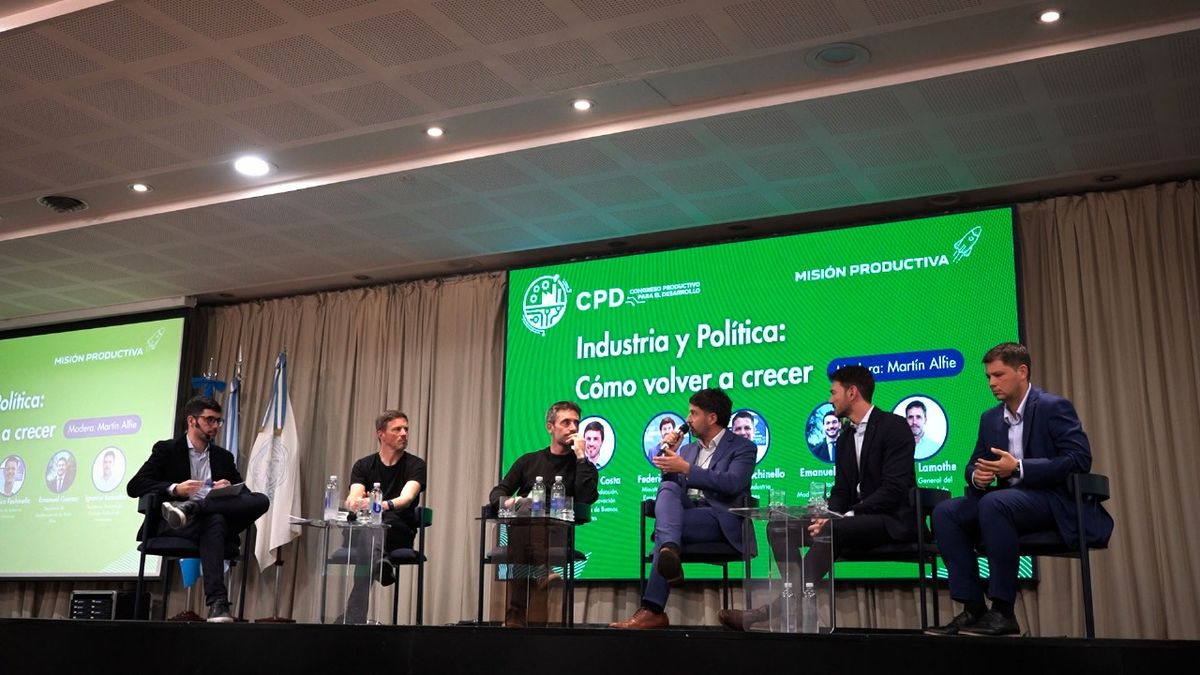Officials of productive areas of different provinces questioned the absence of a national industrial policy and called an intra -party consensus about the importance of having a 21st century industrywhich contemplates both the relevance of the sector in terms of employment and chains with other activities, as well as the new demands in innovation and technology. They did it within the framework of the First Productive Congress for Development, organized by Productive missiona space that brings together different professionals with experience both in the public sector and in the private sector.
With an intention of giving a federal and transverse vision at the ideological level to the debate, the first panel, called “Industry and Politics: How to grow again”was attended by Augusto Costa, Minister of Production of the Province of Buenos Aires, Federico Bazán, head of Labor, Industry, Employment and Mining of La Rioja, Federico Fachinello, Minister of Industry of Missions, Emanuel Gainza, Secretary of Modernization of Entre Ríos and Ignacio Lamothe, general secretary of the Federal Investment Council (CFI).
Industry in crisis: the difficulties of the provinces to design policies without the support of Nation
As kicking of the event, held at the Faculty of Economic Sciences of the UBA, Coast He assured that the contempt that the Government of Javier Milei has for the industry will naturally impact mainly on the province of Buenos Aires since it is the one that produces 50% of industrial goods. “Making industrial policy from the provinces is complex when the macro environment does not accompany“, held.
In that sense, the economist said that “Industrial policy has to drive nation“And that the provinces have to cooperate with each other. Contrary, he pointed out that the government” is telling us: ‘Matter and compete’. “
Before consulting Scope On the factors that are hitting the Buenos Aires productive framework, Costa highlighted the exchange rate appreciation, the indiscriminate opening of imports, the paralysis of infrastructure works and a shrinking of the domestic market. “The provincial state works as a shield and network, but cannot supplant a national state that deserts its responsibilities”He said.
“The world is giving us the possibility to discuss again industrial policy. That is the new song that we have to play and that many denied for years“He said, referring to the request for” new songs “that Governor Axel Kicillof once popularized in a political act.
For its part, Bazán emphasized the negative impact that commercial opening It generated on the Textile sector of La Rioja, which represents a third of the industrial production of the province, something that Costa also mentioned by exemplifying the increase in footwear imports for 11 million pairs and the closure of the plant das in Colonel Suárez. In addition, the Cuyano official stressed to the Fall of consumption as another key factor when explaining the sector crisis.
Added value, infrastructure and innovation works: the demands of the provincial industries
The Rioja emphasized the relevance in which the exploitation of natural resources brings value aggregation. In this regard, it celebrated the return of mining projects to the province, in which the industry must have a fundamental role as a supplier.
In turn, FACHINELLO He warned about the critical context for missionary SMEs, which must compete with companies from bordering countries in unfavorable conditions. “We need policies for the development of infrastructure and energy connectiontaking into account that we are one of the few provinces without natural gas, “he deepened.
Meanwhile, Gainza focused his speech on the relevance of digital transformation and connectivity development“That today are the equivalent of what 100 years ago was the development of the rail or electricity.” With that horizon, I do not doubt that “the interior has enormous development potential”, but warned that this potential will only be used with an “efficient state, which reaches where the private cannot” and “consensus, beyond partisan identity.”
The role of the ICC to articulate productive development policies between the provinces
Finally, Lamothe, He highlighted the role of the ICC when “putting together a road map for the development of the country” and the Federal Development School that are carrying out with the aim of training young people about the issues that structure the productive development of the country. ” “Unlike what is believed, young people are interested in these issues. You have to continue betting on the formation of political cadres,” he said.
With that goal, he marked the importance of the articulation between the agency and the future executors of the policies (something that Bazán also pointed out) and called to correct the fact that many times the knowledge generated in Argentina “are disconnected from the socio-political reality of the country.”
Manifesto for an industrialism of the 21st century
“Manifesto for an industrialism of the 21st century” was the slogan with which productive mission launched this first congress, with a room full of the Faculty of Economics. First, that manifesto included the conviction that industry is a key engine for developmentsince it represents 20% of GDP, generates more than two and a half million positions with salaries above the average, most of the R&D spending of the private sector and 57% of exports of goods and services.
However, he warned about the need to abandon the old formulas to make industrial policybased on a blind defense of protection and subsidies, and a generation of false dilemma such as the internal market vs. exports, or that of VS Agro industry.
It is as a result that they raised the urgency of thinking a 21st century industry“That recognizes technological changes, which understands that innovation is a central axis, which permanently seeks to increase productivity, which selects priorities, identifies strategic sectors, and evaluates and redefines productive policies.”
Source: Ambito




